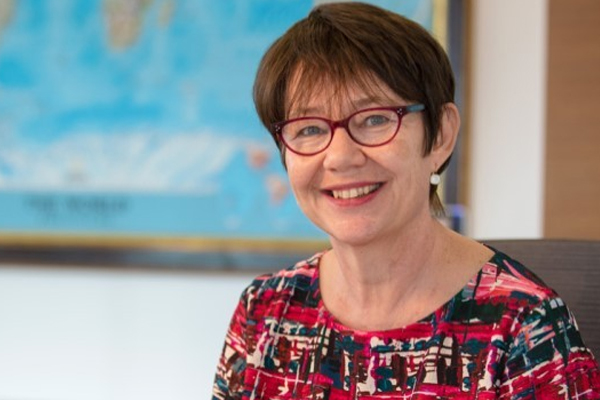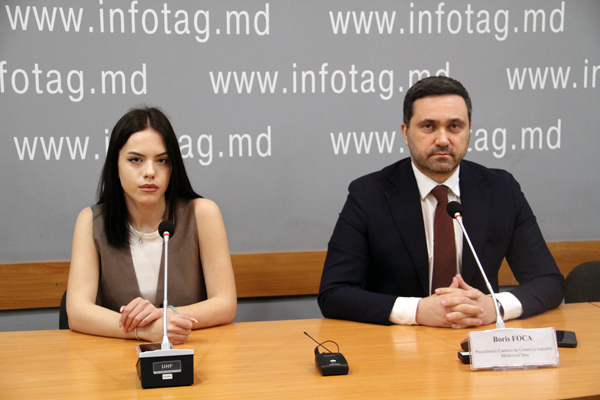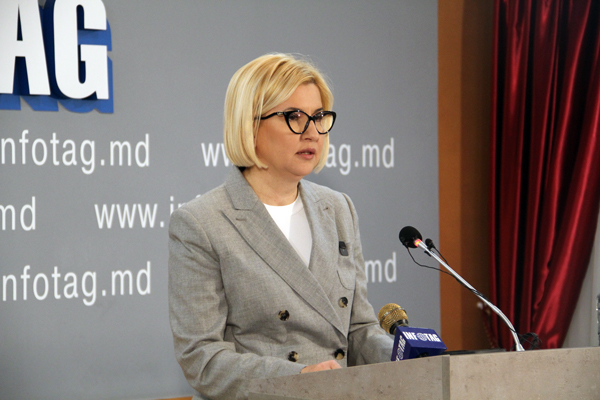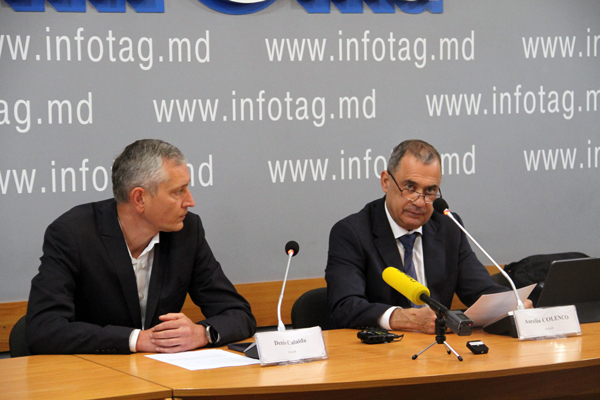Interview
ODILE RENAUD-BASSO: EBRD LOAN TO HELP COVER 75% OF MOLDOVA'S GAS NEEDS NEXT WINTER

Interview given to INFOTAG news agency's reporter Margareta Mocreac by EBRD President Odile Renaud-Basso, who visited Moldova on 24-26 July.
INFOTAG: Mrs. Odile Renaud-Basso, you are making your second visit to Moldova in less than two years. Is this another proof that Moldova is high on the EBRD's agenda?
ODILE RENAUD-BASSO: Indeed, Moldova is very important for us. Your country has been greatly impacted by the Russian war on Ukraineand we really believe that it is important to help Moldova cope with the destabilising effect of this invasion. To this end, the EBRD increased its lending to Moldova, posting an all-time high of €525 million in 2022. A large part of these funds went to energy and energy security. I first visited Chisinau just before the war started. Now I thought it was important to come back and see what we can do and how we can further help and support your country and to define the priorities for moving forward.
INFOTAG: Tell us please about your meetings with the Moldovan authorities?
ODILE RENAUD-BASSO: I met President Maia Sandu, Speaker Igor Grosu and Prime Minister Dorin Recean. I also talked to several ministers and to our client banks and met some clients in the energy sector. I also took part in the inauguration of a new 55-km EBRD-financed Ciumai-Vulcanesti road in southern Moldova, and had the opportunity to visit the port of Giurgiulesti. So, this visit helped me to have a better vision of what we are doing in Moldova and of what we can do in the years to come.
INFOTAG: So, what could you say about Moldova's key needs during this challenging period and what more could the EBRD do for our country given the fact that it is already the largest institutional investor in Moldova?
ODILE RENAUD-BASSO: I think the Bank can continue to have a high level of investment. Last year we had a record level of investment of 525 million euros investment. This year we expect to invest well over 200 million euros, which is still quite high compared to our average annual investments prior to 2022.
On energy security, we will continue adding more financing this year. Last year, Moldova benefitted from a revolving line of 300 million euros to procure gas from European markets, and we just approved additional financing of 165 million euros to buy gas this year too. We talked about this at the meeting with the authorities.On top of that, we expect some donor support for the loan.So, these funds, 465 million euros in total, will enable the government to buy, at current prices, 75% of the country's gas needs for the next cold period. We will be signing with the government shortly, so that they canbuy gas in the summer/early autumn when prices are lower. We believe that it is very important to diversify energy sources given that Moldova is in a very fragile situation and dependent on Russia.
In the current circumstances, that is very risky. We believe that the EBRD loan is a good way to really protect against risks and ensure energy security for the next winter.
Answering your question about what else the country needs, I think Moldova has important infrastructure needs. During my visit, we travelled quite far inside the country and I could see that many roads are uneven and bumpy. But good roads are a key condition for economic development. They also enhance connectivity with Ukraine, so we will continue to invest in them.
The EBRD can also continue to support the private sector because it had been affected seriously by COVID-19 and now by the war onUkraine., Therefore, it is important to see what we can do to continue to provide access to credit and investment.
INFOTAG: During the visit, you also signed a deal with a private Moldovan bank. What is it about?
ODILE RENAUD-BASSO:On behalf of the EBRD, I signed a new €5 million loan with Victoriabank. The loan will help Moldovan firms across the country to become more competitive locally and internationally. The support is part of a joint programme - the EU4Business-EBRD credit line - for which the EBRD provides finance to SMEs through partner financial institutions, while the EU complements the offer with incentive grants under the EU4Business initiative.
The borrowers will be able to invest in modern equipment and production upgrades, enhance product quality, health and safety measures, and, especially, advance environmental practices and resource efficiency since at least 70% of the loan is expected to fund green technologies.
INFOTAG: You announced that Catarina Bjorlin Hansen will replace Angela Sax as head of the EBRD office in Moldova. Mrs Sax's mandate coincided with a challenging time for Moldova and Europe. What can you say about her mandate and the tasks that Caterina Bjorlin Hansen will have to fulfil?
ODILE RENAUD-BASSO: Indeed, Angela Sax worked during a very difficult time - COVID-19 and now Russia’s war on Ukraine which is having major consequences for Moldova. So, I think she was very instrumental in developing financing activity, developing projects, working very well with our private sector clients but also with the government in order to agree on priorities and help with some public sector projects. I think Angela Sax has done a terrific job.
The priority of the new head of the office is to build on this and to continue to deepen partnership with the government and our clients and to be the “ambassador”of the EBRD in Moldova, but also the advocate of Moldova at the EBRD.
INFOTAG: There is a discussion in our country today regarding the future of Chisinau international airport: whether it should remain state property or whether it should be sold again, this time to a reputable Western company. Even the members of the ruling party have different opinions about this. What advice would the EBDR give to the Moldovan government regarding the management of the airport?
ODILE RENAUD-BASSO: I think there are different models and it will be up to the government to choose the best one for Chisinau international airport.
There are examples of airports which are successfully managed by private companies and by the public sector.
If the government chooses the first option, then the most important thing is to make sure that everything is done very, very transparently. The competition, the selection and payment procedures should be very well prepared and transparent. You need to have professionals to do it because that is indeed very important.
But, as I said, there are also countries where the airports are publicly managed and there are good successes as well. In this case, transparency is also very important. It is necessary to persuade the Moldovan public that the government can be a good manager too despite some not so good examples in the past.
INFOTAG: You travelled to the south of the country to open a new road. Maybe there were things that caught your attention, which surprised or impressed you? Or, on the country, there were things that disappointed you?
ODILE RENAUD-BASSO: My first visit to Moldova took place in winter so now I had the opportunity to see the real beauty of the countryside, all these sunflowers, green fields and nature.
At the same time, I realized that we need to invest more, especially in roads. In Moldova there is a real need for this.
I was also very interested to visit the Giurgiulesti port and to really understand the geography of the access to the venue, which is a very important window for trade for your country. I think the port has a lot of potential that needs to be developed. The proximity between Ukraine, Moldova and Romania is very striking. I was interested to see this site and all the opportunities that it represents for the country.
INFOTAG:Is the EBRD ready to make more investments in the port? Do you think it needs more investments?
ODILE RENAUD-BASSO: Yes, more investments are definitely needed. The port needs to develop further and increase its potential. For instance, we saw many trucks waiting to get to the port, creating a bit of a bottleneck, so there is potential to do more to increase port capacity.
I think the Giurgiulesti port is important for Moldova, but also for Ukraine as a part of the solidarity lanesto create additional export capacity. So, in a way, it is a contribution to food security. I believe it makes sense for Moldova to develop this port and the EBRD is ready to help.
























Add Comment